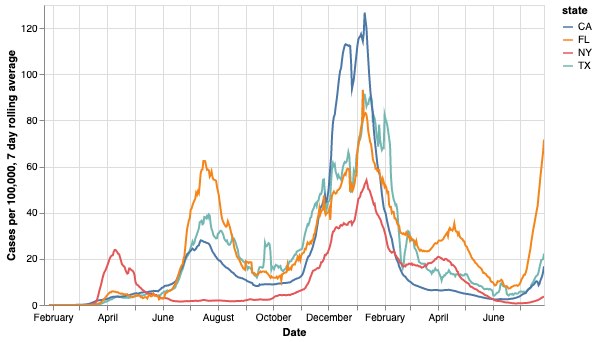Did the CDC jump the gun?
With this and all things, you don't want to go to extremes of either hysteria or overconfidence. I do think the authorities have to provide clear and thorough current stats, given the rise of Delta. From what I've seen and posted here recently, the recent reports from hospitals show that the serious cases overwhelmingly disfavor the unvaccinated. Much harder to get an overall picture of the extent to which the vaccinated are becoming an increasing percentage of the unserious cases (the asymptomatic and the "mild").
bub said:
With this and all things, you don't want to go to extremes of either hysteria or overconfidence. I do think the authorities have to provide clear and thorough current stats, given the rise of Delta. From what I've seen and posted here recently, the recent reports from hospitals show that the serious cases overwhelmingly disfavor the unvaccinated. Much harder to get an overall picture of the extent to which the vaccinated are becoming an increasing percentage of the unserious cases (the asymptomatic and the "mild").
in places like MA and NJ, the vast majority of people over the age of 25 are vaccinated. It's like 90+% among seniors. So among the small number of cases we're getting (9 per 100K) each day, it would not be surprising if most of the positive tests would be breakthroughs. But if we didn't have the vaccinate rate we have in this state, we'd be looking at 60, 70, or 80 positives per 100K, with a lot of them serious enough for hospitalization.
you know I'm totally in the vaccination camp. Some of the very recent stats are still disturbing however. For example, in March vaccinated people in LA County represented 2% of new cases. In June, they were 20%. That's a big change.
bub said:
you know I'm totally in the vaccination camp. Some of the very recent stats are still disturbing however. For example, in March vaccinated people in LA County represented 2% of new cases. In June, they were 20%. That's a big change.
Did they say what was the difference between March and June in % of vaccinated people in LA County vs. the whole population? (eta: and is that actually a relevant question? math/stat not my strong suit)
iirc, in March (in Wisconsin), at age 74 i was just beginning to be eligible, and it wasn't that easy to get an appointment for vaccination. By June, I think even the teens had become eligible.
bub said:
you know I'm totally in the vaccination camp. Some of the very recent stats are still disturbing however. For example, in March vaccinated people in LA County represented 2% of new cases. In June, they were 20%. That's a big change.
That speaks to the properties of the COVID-19 delta variant. It is so much more transmissible than other versions of COVID-19. Anyone who gets it winds up with more viral particles lodged in their nasal and respiratory epithelia (cells lining the passages) than before. The amount is large enough to be expelled via exhalation for a while before a vaccinated person's immune system can eradicate it. I know for certain I said this was a possibility, even before the delta variant arose, many times on this and another thread. It's much worse with the delta version.
https://els-jbs-prod-cdn.jbs.elsevierhealth.com/pb/assets/raw/Health%20Advance/journals/jmcp/jmcp_ft96_5_1.pdf?fbclid=IwAR1VaaqSbJuCXkjxp0qLGAp2HemCA3awcG0meq_ndxNZqv4j6pOPf0uDhs4
This is a preprint validating the measures we've known to work all along. It's a collection of data from experiments from 9/2020 to 12/2020.
Vaccinated or no, keep wearing that fuvking mask when you're indoors and keep up with that maintaining a safe distance. Please.
PeterWick said:
I know for certain I said this was a possibility,
I know bikefixed said this, but who's Peter Wick?

Ms. Mandavilli is a woman I've been following to read her reporting for more than a year now.
https://www.nytimes.com/2021/07/30/health/cdc-vaccinated-delta.html
Check out this graphic for a visual representation of where the original COVID-19 and the delta variant fit into the behavioral world of viruses. Yeah, I'm just a bundle of happy news today.
BTW, the X-axis might be linear but the Y-axis is logarithmic. So that tiny visual elevation in the range of the delta variant's potential for serious illness is more than it looks. They just wouldn't have enough room on the graph to put it in proper context with other viruses if it was linear.
NYC to require proof of vaccination for restaurants and gyms:
https://www.cnn.com/2021/08/03/business/new-york-city-vaccine-requirements/index.html
But not until September 13th. I think it's a good idea - but I have to say - the vax cards are incredibly easy to create on your own. They should have included some sort of watermark or other element that's not easy to duplicate.
jamie said:
NYC to require proof of vaccination for restaurants and gyms:
https://www.cnn.com/2021/08/03/business/new-york-city-vaccine-requirements/index.html
But not until September 13th. I think it's a good idea - but I have to say - the vax cards are incredibly easy to create on your own. They should have included some sort of watermark or other element that's not easy to duplicate.
I'm not too worried about that. The whole pandemic game is about getting past the probabilistic tipping point so that the odds come out in our favor more often than not. Before we had the vaccine, masks were a big part of this as they reduced the odds of transmission. They didn't eliminate them, but helped weigh each roll of the die more in our favor. Similarly, pushing for social distancing was about weighing the odds in our favor (well, more attempting to roll the die less often). Not everyone social distanced, and not everyone did all of the time, but the odds of an outbreak were smaller, and the odds of an outbreak spreading were smaller, with this
Now we have vaccines, which as we all know aren't a 100% guarantee to stop infection and spread, but they heavily weigh the die in our favor. If the occassional person decides to be a selfish jerk and lie about their vaccination status, that's not great, but overall we're still doing ok. The effort of making the system foolproof would be disproportionate to the benefits, IMO.
I wanted to make a new thread about this but I had to take a break from checking it for my class. And I lost track of the friggin' article. It was a pretty recent account of a problem that may be in our future. Nightmare fuel, if you will. That said, here are 3 articles that discuss evidence that people who have recovered from active COVID infections have elements of their immune system that provide some lasting resistance against future infections. The vaccines produce much better defensive capacity in these studies.
https://www.precisionvaccinations.com/natural-immunity-after-covid-19-found-durable-and-robust
https://jamanetwork.com/journals/jama/fullarticle/2782139
The report I'm trying to find discusses results indicating that vaccinated people may not have great protection after several months compared to COVID survivors. Before I go on as though I know definitively I'll just give a sort of review of a functional difference between a vaccination vs an actual viral infection.
The COVID vaccines have been manufactured to induce antibody production against important parts of the spike protein on COVID's outer surface. That's the receptor-binding domain (RBD). It's the business end of the way the virus grabs ahold and hangs on. Great. Results have been conclusive. They really bolster our ability to jump all over COVID and keep it from causing major harm.
However, those vaccines are teaching us to recognize a specific part of the "wild type" (the original one that first swept the world) virus. I'm not even aware of efforts to include any of the subsequent variants' target sequences. The data suggest that may not be enough over time. Again, I wish I could find the article to discuss actual details. It's like training someone to focus on recognizing the script capital "T" on a Titleist brand golfball. Sure, that's great, until some marketing intern at Titleist comes up with some great idea to change the logo. The company thinks it's awesome and the next year's ball comes out and there's a whole new advertising campaign.
By comparison, surviving real infections involves our immune system's T-cells capturing viral particles and tearing them apart. Those pieces are then "presented" as things to produce antibodies against so survivors wind up with an array of antibodies that target different parts of the virus. As we've seen, many people do not make effective antibodies in time and have severe illness and/or die. They determined what to target with the vaccines from survivor convalescent plasma. Anyway, in addition to those antibodies that get awarded the MVP award at the survival jubilee, all those other antibodies probably do some degree of damage, too. They're still going to be produced and appear to help recognize COVID, too, only in different ways. A much broader search and that's what this report suggested was better protection for the future.
A potential solution would be producing booster vaccine doses that introduce more targets to develop antibodies against. Maybe the vaccine folks are already preparing boosters targeting the variants that have popped up. I don't know.
Ya know what would help right now though? Getting more people vaccinated so as to limit the chances of spreading the virus and allowing it to mutate into other variants. Wearing masks again, even if vaccinated, too.
That spike protein probably isn't the only part of the virus where mutations could occur that make COVID-19 variants with more harmful capabilities.
PeterWick said:
I wanted to make a new thread about this but I had to take a break from checking it for my class. And I lost track of the friggin' article. It was a pretty recent account of a problem that may be in our future. Nightmare fuel, if you will. That said, here are 3 articles that discuss evidence that people who have recovered from active COVID infections have elements of their immune system that provide some lasting resistance against future infections. The vaccines produce much better defensive capacity in these studies.
https://www.precisionvaccinations.com/natural-immunity-after-covid-19-found-durable-and-robust
https://jamanetwork.com/journals/jama/fullarticle/2782139
The report I'm trying to find discusses results indicating that vaccinated people may not have great protection after several months compared to COVID survivors. Before I go on as though I know definitively I'll just give a sort of review of a functional difference between a vaccination vs an actual viral infection.
The COVID vaccines have been manufactured to induce antibody production against important parts of the spike protein on COVID's outer surface. That's the receptor-binding domain (RBD). It's the business end of the way the virus grabs ahold and hangs on. Great. Results have been conclusive. They really bolster our ability to jump all over COVID and keep it from causing major harm.
However, those vaccines are teaching us to recognize a specific part of the "wild type" (the original one that first swept the world) virus. I'm not even aware of efforts to include any of the subsequent variants' target sequences. The data suggest that may not be enough over time. Again, I wish I could find the article to discuss actual details. It's like training someone to focus on recognizing the script capital "T" on a Titleist brand golfball. Sure, that's great, until some marketing intern at Titleist comes up with some great idea to change the logo. The company thinks it's awesome and the next year's ball comes out and there's a whole new advertising campaign.
By comparison, surviving real infections involves our immune system's T-cells capturing viral particles and tearing them apart. Those pieces are then "presented" as things to produce antibodies against so survivors wind up with an array of antibodies that target different parts of the virus. As we've seen, many people do not make effective antibodies in time and have severe illness and/or die. They determined what to target with the vaccines from survivor convalescent plasma. Anyway, in addition to those antibodies that get awarded the MVP award at the survival jubilee, all those other antibodies probably do some degree of damage, too. They're still going to be produced and appear to help recognize COVID, too, only in different ways. A much broader search and that's what this report suggested was better protection for the future.
A potential solution would be producing booster vaccine doses that introduce more targets to develop antibodies against. Maybe the vaccine folks are already preparing boosters targeting the variants that have popped up. I don't know.
Thanks -- this goes some way toward address the question Terp raised earlier on data out of Israel potentially showing less infection among previously infected than among vaccinated. I'm still not sold that the data actually say that -- the link he have was to what looks like an Israeli TV station, and I haven't come across actual reporting elsewhere looking at this (yeah, you can google, but all the results I've found seem to be from the sort of place pushing anti-parasite meds as covid cures), so I can't form a good sense on how to evaluate that claim yet.
If it does turn out to have anything to it, the above helps me understand how that could be. And to your point (and DaveSchmidt's earlier), "get infected with covid and hoping you make it out ok instead of getting vaccinated and have the small risk of a mild or asymptomatic case" is a terrible strategy -- this is more a topic I'm interested in just to enhance my understanding, not because of any directly practical application.
I honestly think this will end up like the flu vaccine. Booster shots every year. In a perfect world everyone would get the vaccine and we would be free of this virus. It ain’t happening. We had 14 days to stay the hell away from each other, and we even screwed that up. Booster shots every year, or could be every 6 months. Who knows.
I was going to mention the recent studies showing that post-infection people with natural immunity were doing well. Good. Not sure it's going to last forever - other coronaviruses have not produced lasting immunity - and these people may also be benefiting from the vaccine since many of them are getting it but again, good. I'm not willing to get sick to get immunity but whatever.
It seems like places where the Delta flare up started early are doing well now - the U.K., the Netherlands, even India. India, at its worst, was seeing around 400,000 case per day. It dropped down to 40,000 in recent weeks and the last day I checked, it was 30,000. So what explains Israel? The one variable that seems to make sense is how early they got vaccinated, supporting the conclusion that at least the Pfizer jab fades significantly after 6 months. They've already jumped on the booster bandwagon. I think its coming for us. I'm fine with it.
PeterWick said:
A potential solution would be producing booster vaccine doses that introduce more targets to develop antibodies against. Maybe the vaccine folks are already preparing boosters targeting the variants that have popped up. I don't know.
Looks like Pfizer trials for booster shots targeting Delta variant are planned to start this month:
https://www.ft.com/content/ae58b9c6-c115-41d8-b102-4e1815248701
“While we believe a third dose of [our vaccine] has the potential to preserve the highest levels of protective efficacy against all currently known variants including Delta, we are remaining vigilant and are developing an updated version of the Pfizer-Covid-19 vaccine,” the companies said.
sprout said:
Looks like Pfizer trials for booster shots targeting Delta variant are planned to start this month:
https://www.ft.com/content/ae58b9c6-c115-41d8-b102-4e1815248701
“While we believe a third dose of [our vaccine] has the potential to preserve the highest levels of protective efficacy against all currently known variants including Delta, we are remaining vigilant and are developing an updated version of the Pfizer-Covid-19 vaccine,” the companies said.
Well, I stand firmly corrected. Thanks for the link!
- I haven't heard much about the J&J vaccine -- is everything I wrote above also applicable to it?
- The new masking guidance is based on the finding that vaccinated people with breakthrough infections are as contagious as unvaccinated with infections, but:
- - Is the length of time someone is contagious for shorter, or not affected at all, or we don't know, for vaccinated with breakthrough?
- - If you're vaccinated you're still far less likely to get infected at all, and so vaccines are still substantially reducing transmission, right?
- regarding transmission, I recall there being uncertainty around whether truly asymptomatic people can transmit or if what we were observing is mild and pre-symptomatic transmission. Was this ever definitively understood, or are we still unsure?
PVW said:
- - If you're vaccinated you're still far less likely to get infected at all, and so vaccines are still substantially reducing transmission, right?
My understanding, too, is that this is a yes, and an important one.
Not precise info out there but my sense is the J&J vaccine is somewhat less effective vs. Delta than than the Moderna and Pfizer shots. Vaccinated people are testing positive at a higher rate than when we were dealing with "classic" Covid but the stats re serious cases are still dramatically in favor of the vaccinated. I saw something this morning that of the thousands of Mississippians who died of Covid this year, only 37 were among the vaccinated. All of those were older and or with comorbidities etc.
TL;DR = Wear a mask.
- I haven't heard much about the J&J vaccine -- is everything I wrote above also applicable to it?
-------> I don't know about that, only that we haven't seen reports of ineffectiveness. That would likely be getting a lot of attention.
- The new masking guidance is based on the finding that vaccinated people with breakthrough infections are as contagious as unvaccinated with infections, but:
- - Is the length of time someone is contagious for shorter, or not affected at all, or we don't know, for vaccinated with breakthrough?
-------> I have not seen hard data on this other than that the viral load in people who contract delta and delta+ is much higher. I would go with a mathematical hypothesis that suggests the more virus someone, vaccinated or not, must deal with, the longer they are at risk of transmitting it. That might mean longer time for unvaccinated than 14 days (BTW, that 14 days is longer than the real risk for the most part. The extra days are just to be more certain since there is variation in the onset of conversion to positive & contagious period). Quarantine or isolation (if COVID+) for vaccinated people is definitely advised, but the period of time may be shorter. Don't know.
- - If you're vaccinated you're still far less likely to get infected at all, and so vaccines are still substantially reducing transmission, right?
--------> This is probably still true against wild type COVID and the earlier variants. The vaccines clearly do not prevent infection very well against the deltas but they do reduce the severity of illness. The findings for that are a veritable 2x4 upside the head.
- regarding transmission, I recall there being uncertainty around whether truly asymptomatic people can transmit or if what we were observing is mild and pre-symptomatic transmission. Was this ever definitively understood, or are we still unsure?
-----------> Asymptomatic people vaccinated or not, are absolutely capable of passing COVID on. The vaccines accelerate someone's clearance of the virus from their system. The deltas are much harder to get rid of due to mutations that allow them to hold onto the ACE binding site on the epithelium longer.
WEAR A MASK!
This is a great article on the issue of viral transmission, aerosols, particles, droplets and the 5-micron particle limit.
https://www.wired.com/story/the-teeny-tiny-scientific-screwup-that-helped-covid-kill/
It doesn't make the WHO look too good.
drummerboy said:
This is a great article on the issue of viral transmission, aerosols, particles, droplets and the 5-micron particle limit.
https://www.wired.com/story/the-teeny-tiny-scientific-screwup-that-helped-covid-kill/
It doesn't make the WHO look too good.
Oh my God! That was a hell of a read. I was in the 5 micron camp all along, not knowing it was wrong. Yikes. Wear those masks, people!
Definitely an interesting read. One notable feature of the pandemic has been observing how we all do with uncertainty. I notice, for instance, that among those who've been critical of social distancing and masking (and now of vaccines), uncertainty and changing guidance as we collective learn more has been fodder for their arguments. "If the WHO/CDC/Dr. Fauci was wrong about X, then they're wrong about everything!" In the first place, I've noticed that where our public health authorities have been wrong, it's generally been in underestimating risks rather than overestimating them -- the opposite of critics' accusations, IOW. But more fundamentally, I've noticed that often those critics are coming from an ideological space that highly values certainty -- conservative religious outlooks or political outlooks that downplay the realities of social interdependence, for instance.
On the other side of things, there's a long and ignoble history of unwarranted and patronizing certainty among the science and medical establishment, and certainly the WHO's behavior, as in this article, fits in that tradition. Among the good-faith vaccine hesitant, I think this is often a big part of what drives their hesitancy, and while they're wrong about the vaccines, they're not necessarily wrong in their skepticism of medical authority.
I would say that overall, I've been more optimistic than pessimistic in observing how science and medicine have been responding, though. "Medical establishment slow to change; dismisses challenges" is really a dog bites man story, after all. "Small group of researchers persevere and succeed in overturning decades of incorrect medical assumptions to the great benefit of public health" is a man bites dog story, and there's been a fair number of those. I think that overall, science and medicine have been responding to the inherent uncertainty and incorporating new information, not as fast as we might hope for, but much faster and effectively than we might expect.
PVW said:
Definitely an interesting read. One notable feature of the pandemic has been observing how we all do with uncertainty. I notice, for instance, that among those who've been critical of social distancing and masking (and now of vaccines), uncertainty and changing guidance as we collective learn more has been fodder for their arguments. "If the WHO/CDC/Dr. Fauci was wrong about X, then they're wrong about everything!" In the first place, I've noticed that where our public health authorities have been wrong, it's generally been in underestimating risks rather than overestimating them -- the opposite of critics' accusations, IOW. But more fundamentally, I've noticed that often those critics are coming from an ideological space that highly values certainty -- conservative religious outlooks or political outlooks that downplay the realities of social interdependence, for instance.
On the other side of things, there's a long and ignoble history of unwarranted and patronizing certainty among the science and medical establishment, and certainly the WHO's behavior, as in this article, fits in that tradition. Among the good-faith vaccine hesitant, I think this is often a big part of what drives their hesitancy, and while they're wrong about the vaccines, they're not necessarily wrong in their skepticism of medical authority.
I would say that overall, I've been more optimistic than pessimistic in observing how science and medicine have been responding, though. "Medical establishment slow to change; dismisses challenges" is really a dog bites man story, after all. "Small group of researchers persevere and succeed in overturning decades of incorrect medical assumptions to the great benefit of public health" is a man bites dog story, and there's been a fair number of those. I think that overall, science and medicine have been responding to the inherent uncertainty and incorporating new information, not as fast as we might hope for, but much faster and effectively than we might expect.
Yeah, I generally agree with you. COVID has been a fast moving target, and it's difficult to keep on top of it.
I do have to say though, that I was skeptical of the "no-mask" stricture from the beginning.
drummerboy said:
Yeah, I generally agree with you. COVID has been a fast moving target, and it's difficult to keep on top of it.
I do have to say though, that I was skeptical of the "no-mask" stricture from the beginning.
That you were, db. That you were.
drummerboy said:
This is a great article on the issue of viral transmission, aerosols, particles, droplets and the 5-micron particle limit.
https://www.wired.com/story/the-teeny-tiny-scientific-screwup-that-helped-covid-kill/
It doesn't make the WHO look too good.
What I find remarkable is that they didn't accept this critical detail for so long.
Meanwhile, if the CDC truly believed that the no mask guidance was based in science, I have to wonder what world they live in. It doesn't take much of a test to see that even a cloth mask reduces the amount of virus inhaled or exhaled.
tjohn said:
What I find remarkable is that they didn't accept this critical detail for so long.
Meanwhile, if the CDC truly believed that the no mask guidance was based in science, I have to wonder what world they live in. It doesn't take much of a test to see that even a cloth mask reduces the amount of virus inhaled or exhaled.
IIRC, there was such a shortage of N95 masks that it seems plausible that it was more important to not panic the public so that healthcare workers could get them.
Could have been an effort at triage.
Who knows why they didn’t suggest simple cloth masks… Maybe they thought they would not be effective.
Sponsored Business
Promote your business here - Businesses get highlighted throughout the site and you can add a deal.
For Sale
-
2007 Honda Fit $4,400
More info






























Alternative facts vs. facts. Never ends well.
Of all the surreal things that happened on during the Trump Administration, promotion of the notion that the pandemic and facemasks are some sort of political construct is the most bizarre.
The ironic thing is that if Trump had managed to respond to the pandemic in an even partially responsible manner, he problem would have won the election. All he had to do was be somewhat supportive of Fauci and the CDC.
I think Obama was absolutely correct when he noted that Trump with his fragile ego couldn't stand be upstaged by a virus.